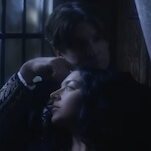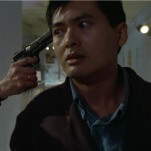Once In The Life

Adapting a stage play for the screen can be just as perilous as adapting a novel, because filmmakers still have to find ways to make it cinematic without diminishing its integrity or power. Otherwise, why not just haul a bunch of camcorders into a theater space? Limited to the intimate confines of a small Off-Broadway venue, Laurence Fishburne's play Riff-Raff might have worked as a muscular showcase for the actors, who could dig into its rat-a-tat street language, poetic soliloquies, and pressure-cooker intensity. But a new title, Once In The Life, appears to represent the lion's share of creative retooling Fishburne has performed for his directorial debut, a boxed-in and overwrought run-through of crime-story clichés. Most of the action takes place in the rat-infested hideout where ex-con Fishburne and his white half-brother Titus Welliver find refuge after botching an attempt to rip off New York City drug boss Paul Calderon. Desperate for help, Fishburne calls on loyal friend and cellmate Eamonn Walker, not knowing that he's also been sent by Calderon, who is holding Walker's wife (Annabella Sciorra) and baby daughter hostage until Walker delivers the two men. With all these combustible elements thrown in the pot, Once In The Life rolls out like an insta-drama, teeming with ready-made themes of trust, honor, loyalty, and brotherhood. Any scenario in which one friend is basically forced to kill the other at the end of the day is bound to crackle with tension, and the actors, particularly Fishburne and Walker, harness all the glowering ferocity they can muster. But without a spark of originality in its writing or direction, Once In The Life lacks color and distinction, coasting on mannered, overripe dialogue (the phrase "Don't call me 'bro'" is repeated enough times to fill a one-act) and gunpoint confrontations. Despite Fishburne's considerable gifts, it's not hard to know where he's going with this story, because it's a place too many others have been.







































